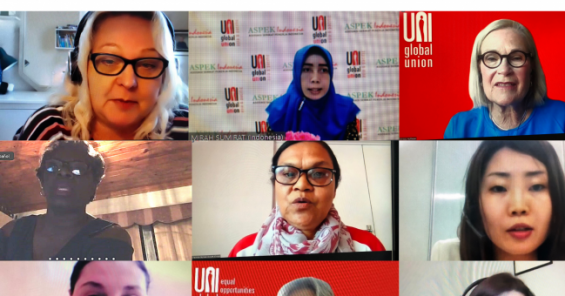More than 127 women from 47 countries and 95 unions joined the last UNI World Women’s Committee meeting which took place online via Zoom on April 13th, 2021.
The meeting, which was presided by Patricia Nyman, UNI World Women President and UNI Africa Women President; was an opportunity for women from all UNI Women Regional Committees, Women’s Networks and Mentoring Program participants, to listen in discussions regarding the impact of the COVID-19 pandemic on women workers, the process of ratification of ILO Convention 190 and its impact in the world of work, as well as all the UNI Equal Opportunities campaigns and activities.
In her welcoming speech, UNI General Secretary, Christy Hoffman emphasized on UNI’s commitment in raising the quality of work, wages and respect for all essential workers, which are in their majority women, fighting in the frontlines.
“76% of care workers and 82% of cashiers on the frontlines in Europe are women”, added Erika Kahara, International Vice President of UNI Europa Women.
To this, Theresa Mortimer, President of UNI Americas Women added that not only are women on the frontlines, but also the ones that are most affected by the pandemic, with unemployment rising in highly feminized areas and gender gaps widening in countries such as Colombia.
The pandemic has also given a sharp rise to violence and gendered based violence, as stated by UNI World Women’s President, Patricia Nyman, who emphasized on the need to ratify ILO Convention 190 to eliminate all forms of violence in the world of work.
Mirah Sumirat, President of UNI Apro Women added, “without a gendered approach to the recovery, the current inequalities and faced by women will continue to grow. If one is oppressed we are all oppressed”.
The meeting was also an opportunity for women from all UNI sectors and regions to share their concerns and issues, as well as to discuss the current state of women’s rights across the world. As a result, three statements regarding anti-asian hate, the withdrawal of Turkey from the Istanbul Convention and the gendered impact of COVID-19 were adopted by the participants.
The wide participation from women from all corners of the world sent a clear and undeniable message that women’s issues are now more relevant than ever and that unions need to address them and include them in their agendas to create more just and equal societies for all.


